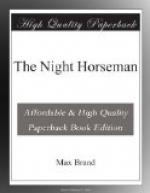“It’s him!” whispered Haw-Haw. “It’s Barry’s black. They ain’t another hoss like him on the range. An’ the wolf—thank God!—ain’t with him.”
But Mac Strann closed the door of the stall, frowning thoughtfully, and thought on the face of Strann was a convulsion of pain. He dropped the second match to his feet, where it ignited a wisp of straw that sent up a puff of light.
“Ah-h!” drawled Mac Strann. “The wolf ain’t here, but we’ll soon have him here. And the thing that brings him here will get rid of the black hoss.”
“Are you goin’ to steal the hoss?”
“Steal him? He couldn’t carry me two mile, a skinny hoss like that. But if Barry ever gets away agin on that hoss I ain’t never goin’ to catch him. That hoss has got to die.”
Haw-Haw Langley caught his breath with a harsh gurgle. For men of the mountain-desert sometimes fall very low indeed, but in their lowest moments it is easier for him to kill a man than a horse. There is the story, for instance, of the cattleman who saw the bull-fight in Juarez, and when the bull gored the first horse the cowpuncher rose in the crowd and sent a bullet through the picador to square the deal. So Haw-Haw sighed.
“Mac,” he whispered, “has it got to be done? Ain’t there any other way? I’ve seen that hoss. When the sun hits him it sets him on fire, he’s that sleek. And his legs is like drawn-iron, they’re that fine. And he’s got a head that’s finer than a man’s head, Mac.”
“I’ve seen him close enough,” answered Mac Strann grimly. “An’ I’ve follered him for a day and a half, damn near. S’pose Barry finds out I’m on his trail; s’pose he won’t foller the wolf when the wolf tries to lead him to me. S’pose he gets on this hoss and cuts away? Can I foller the wind, Haw-Haw? This hoss has got to die!”
From the manger he threw out several armfuls of hay, wrenched down from behind the manger several light boards, and tossed them on the hay. He lighted a match and was approaching the small flame to the pile of inflammables when Haw-Haw Langley cried softly: “Hark, Mac!”
The big man instantly extinguished the match. For a moment they could distinguish nothing, but then they heard the sharp, high chorus of the wild geese flying north. Haw-Haw Langley snickered apologetically.
“That was what I heard a minute ago!” he said. “And it sounded like voices comin’.”
A snarl of contempt from Mac Strann; then he scratched another match and at once the flame licked up the side of the hay and cast a long arm up the wooden wall.
“Out of this quick!” commanded Mac Strann, and they started hastily down the barn towards the door. The fire behind them, after the puff of flame from the hay, had died away to a ghastly and irregular glow with the crackle of the slowly catching wood. It gave small light to guide them; only enough, indeed, to deceive the eye. The posts of the stalls grew into vast, shadowy images; the irregularities of the floor became high places and pits alternately. But when they were half way to the door Haw-Haw Langley saw a form too grim to be a shadow, blocking their path. It was merely a blacker shape among the shades, but Haw-Haw was aware of the two shining eyes, and stopped short in his tracks.




